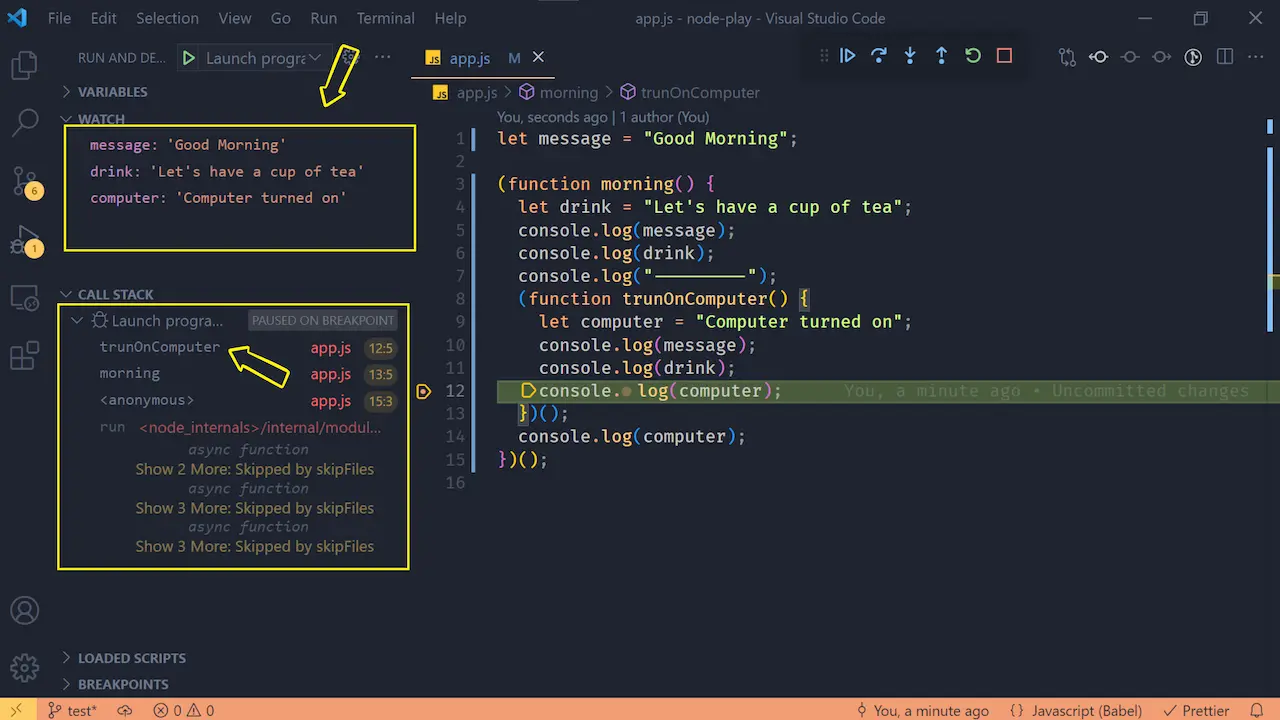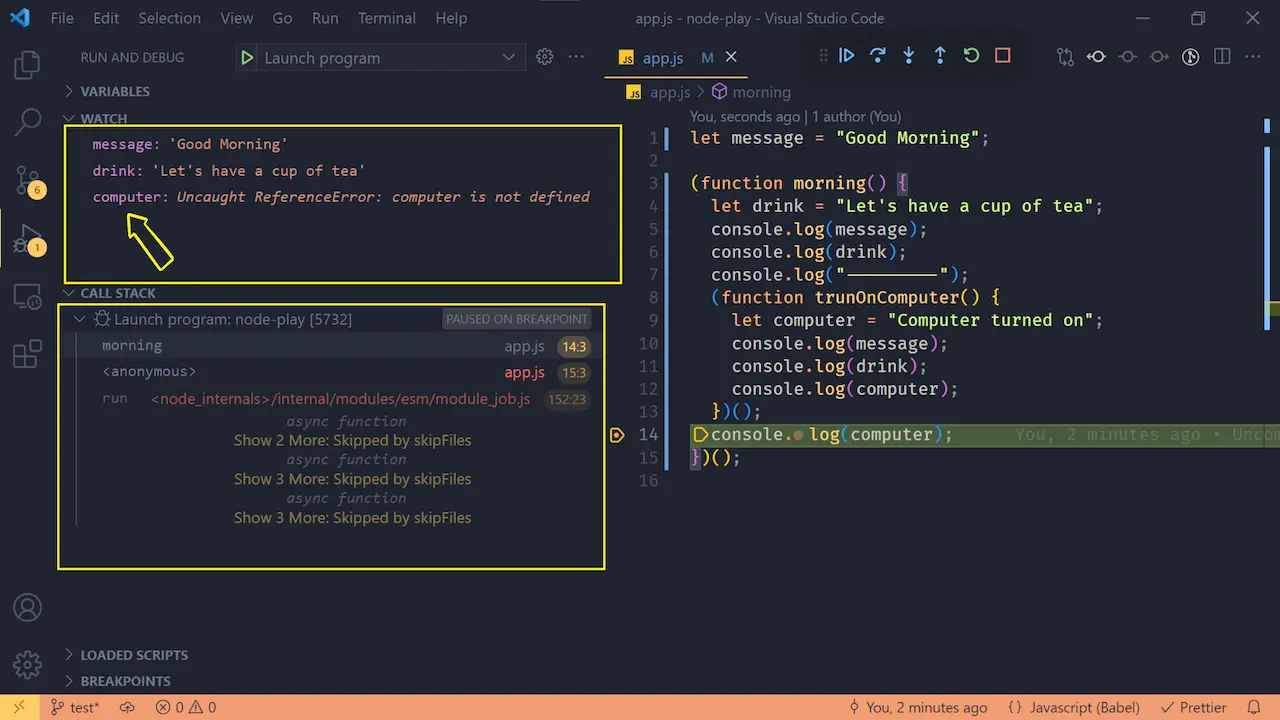Scope
What is a scope?
The ability to access variables and functions is known as the scope in programming. JavaScript has three types of scope: global scope, local scope and block scope.
Global Scope
Global Scope => If a variable or a function is accessible from anywhere i.e globally, then it has global scope.
Let me take an example:
let message = "Good Morning";
(function greeting() {
(function sayGoodMoring() {
console.log(message); // => global scope
})();
})();
//logs
// Good Morning
Function Scope
Local Scope (aka function scope) => The variables you declare inside a function are local to that function. And it cannot be accessed outside of the function, this is known as a local scope or function scope.
Let me take an example:
let message = "Good Morning";
(function greeting() {
let message = "Good Evening";
(function sayGoodEvening() {
console.log(message); // => local/function scope
})();
})();
console.log(message);
// logs
// Good Evening
// Good Morning
Block Scope
Block Scope => To understand block scope, we must know what is a block?
Anything you see inside { } curly bracket is a block. It can be if, else, for, while etc.
Let me take an example:
let message = "Good Morning";
if (true) {
let message = "Good Evening";
var drink = "Coffee";
let phone = "Samsung";
console.log(message);
if (true) {
console.log(phone); // Samsung
}
}
if (true) {
console.log(phone); //ReferenceError: phone is not defined
}
console.log(message); // Good Morning
console.log(drink); // Coffee
console.log(phone); // ReferenceError: phone is not defined
The block scope is quite similar to the function scope. The declared variables are only accessible inside the block.
You might notice the variable drink is declared using var did not have block scope and it is accessible outside the block.
This is the flaw of the var keyword in JavaScript, it somehow manages to function scope but it did not have the block scope. Hence, in ES6 the let and const keywords are introduced to fix this flaw.
The let and const has block scope. Variables declared using let can be rea-initialized. But variables declared with const cannot be re-initialized.
Tip
Try to declare variables using the const keyword whenever possible.
You might have a question, in the case of block scope and function scope the declared variables have access to the local. What if I try to access the variable from an inside function or block?
The answer is yes, it can be accessed from the inner function/block no matter how deep you go.
I already used the phone variable from an insider bock. Let's get a bit deeper with another example.
let message = "Good Morning";
(function morning() {
let drink = "Let's have a cup of tea";
console.log(message);
console.log(drink);
console.log("---------");
(function trunOnComputer() {
let computer = "Computer turned on";
console.log(message);
console.log(drink);
console.log(computer);
})();
console.log(computer);
})();
The code is very straightforward, now pay attention to these three variables I declared message, drink and computer.

When the debugger is at turnOnComputer() function all three of these variables are assessable. As you can see the turnOnComputer() function is at the top of the call stack and all three variables are accessible from here.
As soon as the turnOnComputer() lefts the call stack, the variable computer becomes not accessible from outer function morning() let's see this in action:

I hold the program at line no 14. Here, the function turnOncompter() completed its execution and left the call stack. At this moment the computer variable is not accessible, it throws ReferenceError: computer is not defined.
From this observation, we found that the most inner function/block has access to the most outer function/block's property i.e variables and functions.
This phenomenon is known as lexical scope, we will study that later.
There is one more interesting thing in scope, let me take an example:
var message = "Hello";
let food = "Spring Roll";
if (true) {
var message = "Hi";
var food = "Pasta";
console.log(message);
console.log(food);
}
console.log(message);
console.log(food);
Can you guess the output? You don't have to, cause it will throw a SyntaxError: Identifier 'food' has already been declared.
In this program, an interesting thing just happened.
First the variable message has been shadowed. When we declared this variable it was initialized with Hello, the same variable has been re-declared and initialized with Hi. Within the if block it will console log Hi, outside the if block it should console log Hello right?
No! the variable has been shadowed, the initial value is replaced when the variable is re-declared. Now it will console log Hi
But when we try the shadow the food variable we got an error. The food has already been declared, and cannot be re-declared. It was illegal Shadowing. The is the major flaw of the var keyword later fixed using let and const keywords.
The reason, we declared the food variable as a global variable, so we will be accessing it from different parts of our program, thus it should not be shadowed, we are allowed to declare the same variable in function/block scope. But we cannot shadow it hence it prevented from re-declaration.
That is why it is recommended to always declare variables with the let and const keywords.
That's it all about the scope, next day we will study lexical scope.